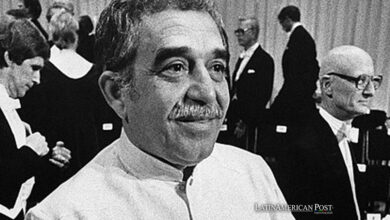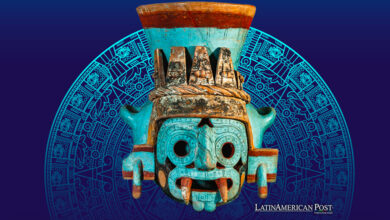Soccer has no expiration date for Kazuyoshi Miura
The Japanese man is the oldest professional footballer.

The player has become the longest-lived footballer. / Photo: IG/yokohamafc_official
LatinAmerican Post | Theoscar Mogollón González
Escucha este artículo
Leer en español: El fútbol no tiene fecha de vencimiento para Kazuyoshi Miura
Kazuyoshi Miura's name may not be as recognized by the average soccer lover . However, the story behind it must be one of the most peculiar of all. The reason? He is the oldest active professional player and also holds the record of being the oldest who still plays matches internationally. He is currently 53 years old and is undoubtedly one of the most important characters in Japanese culture.
When Argentina and Maradona were consecrated in the 1986 World Cup in Mexico, soccer began to transcend borders and take on greater globalization, expanding to corners of the world where this sport was not so important. Right there, in the mid-80s, a 15-year-old Miura left his native Japan to train as a footballer on the other side of the continent, specifically in Brazil.
Upon arriving in the city of São Paulo, the young man settled in one of the largest Japanese communities abroad in the world after the Second World War. While trying to make his way into soccer against the Brazilians, Miura made a living from jobs as a salesman or tour guide. Not an easy life at all, since he had no fixed house and had to go through several shelters.
His beginnings in football were with Matsubara, an amateur club of the Japanese from the city of São Paulo. However, thanks to his incredible talent, he signed his first professional contract in 1986 with Santos FC, although he only played two games. From there he wore the shirts of Palmeiras, Clube de Regatas, EC XV de Novembro, Coritibia and again Santos, all this until 1990. On Rio de Janeiro soil he ended up winning the Alagoan Championship with Regatas (1987) and the Paranaense Championship with Coritibia ( 1989).
Miura returned to Japan to play for Yomiuri SC, a semi-professional club of the Japan Soccer League. By 1992 the entity became professional and changed its name to Verdy Kawasaki. Shortly after, with the intention of creating the professional league of Japan (J League), the brains in marketing did not hesitate to give the spotlight to Miura with an incredible campaign that contributed enormously in his deification. The striker contributed to the team winning the first two editions (1993 and 1994), as well as the J League Cup.
After this, he became the first Japanese to play in Italy after his loan to Genoa. However, Miura failed to adapt to Italian football, in addition to having problems with the coach and suffering a severe injury in his debut against AC Milan. Still, the Japanese played a total of 21 games with just one goal, against Sampdoria. At the end of the season, although he received several offers from other foreign clubs, he chose to stay four more years with Verdy Kawasaki.
To add one more achievement to his resume, he returned to the old continent on loan to Dinamo Zagreb of Croatia in the 1999 winter market, this with the intention of becoming the first Japanese to play in the Champions League. Added to this, he ended the season by winning the Croatian league. After returning to his country, he played with Kyoto Purple Sanga for two seasons and then with Vissel Kobe for another four.
By 2005, Miura signed with Yokohama FC, his current team, which at that time was in the Second Division. He had a brief departure in December of that same year to Australia, with Sydney FC to play the Club World Cup. Upon returning to the Japanese entity, he helped in the promotion of the club to the J League being the oldest footballer in the highest category with 46 years.
A star off the court
It should be noted that Miura is a character closely linked to show business. In 1993 he married the actress and model Risako Shitara, a Japanese born in New York, which made it possible for him to film several commercials for different brands and star in a couple of Detective Conan films. To this we can also add a section that he had in a variety TV program with his famous “dance to the beat of batucada”.
On the other hand, the so-called << King Kazu >> had an incredible magnet for advertising. While he was in Brazil he caught the attention of many people, since it was unprecedented to see a Japanese man play with the same quality as a Brazilian. That earned him covers in newspapers and magazines. In fact, when in Japan they found out about this eventuality, advertising contracts rained on him.
Also read: The controversial career of Marcelo Bielsa, the Leeds United manager
While in Europe, with Genoa specifically, the Japanese radio company Kenwood sponsored the team's jersey. In turn, his signing with Zagreb was with the intention of attracting Japanese money at a critical moment that Croatia was going through at that time, as the president of the entity Flagno Tujman confessed.
As he was a very popular figure, Yoichi Takahashi was inspired by him to create the comic Captain Tsubasa (Superchamps), well known in the nineties. " It is very obvious, Tsubasa is inspired by our King Kazu , to the point that he leaves Japan to go play in Brazil. Their professional lives almost run at the same time, " confessed the author of the manga.
His only debt: the World Cup
At the national level, Miura also left a very important mark. In total, he played 98 games and scored 55 goals, becoming Japan's second all-time top scorer behind Kunishige Kamamoto. His official debut was in 1990 and two years later he was part of the team that won the Dinastia Cup and the Asian Cup, where he was also the most valuable player.
However, not everything was rosy for him. On the way to the 1994 World Cup, Miura started almost every game, scoring 12 goals in 14 appearances. In the 98 Qualifiers, King Kazu contributed greatly to the Blue Samurai qualifying for their first World Cup event, however, in an inexplicable way DT Takeshi Okada left him out of the final list.
Many say that the strategist never got along with that forward who dyed his hair, danced samba and appeared in the magazines. A couple of years later, on June 6, 2000 to be exact, Miura was playing his last game with the Japanese team in a friendly match against Jamaica in Casablanca, Morocco.
But fate had prepared a gift for him for his great dedication and discipline. In 2012, at the age of 45, he was called up to be part of the Japanese team that played the FIFA Futsal World Cup in Thailand. There, Japan faced Brazil, Portugal and Libya in the group stage, qualifying to the round of 16 where they would be defeated 6-3 by Ukraine.
No expiration date
In 2017 he surpassed the record of Englishman Stanley Matthews as the oldest professional footballer in the world. " I will make daily efforts to achieve the goal of staying in this division and I will not forget the feelings of gratitude and passion for football. I will do my best to be able to help the team win, " said the Japanese at the time.
But everything seems to indicate that this record will continue to extend indefinitely. In this same 2020, after the resumption of Japanese football , Kazuyoshi Miura broke that record after playing 63 minutes in the victory of Yokohama FC against Sagan Tosu, on August 5. With 53 years, Miura still plays football as if he were a teenager.




